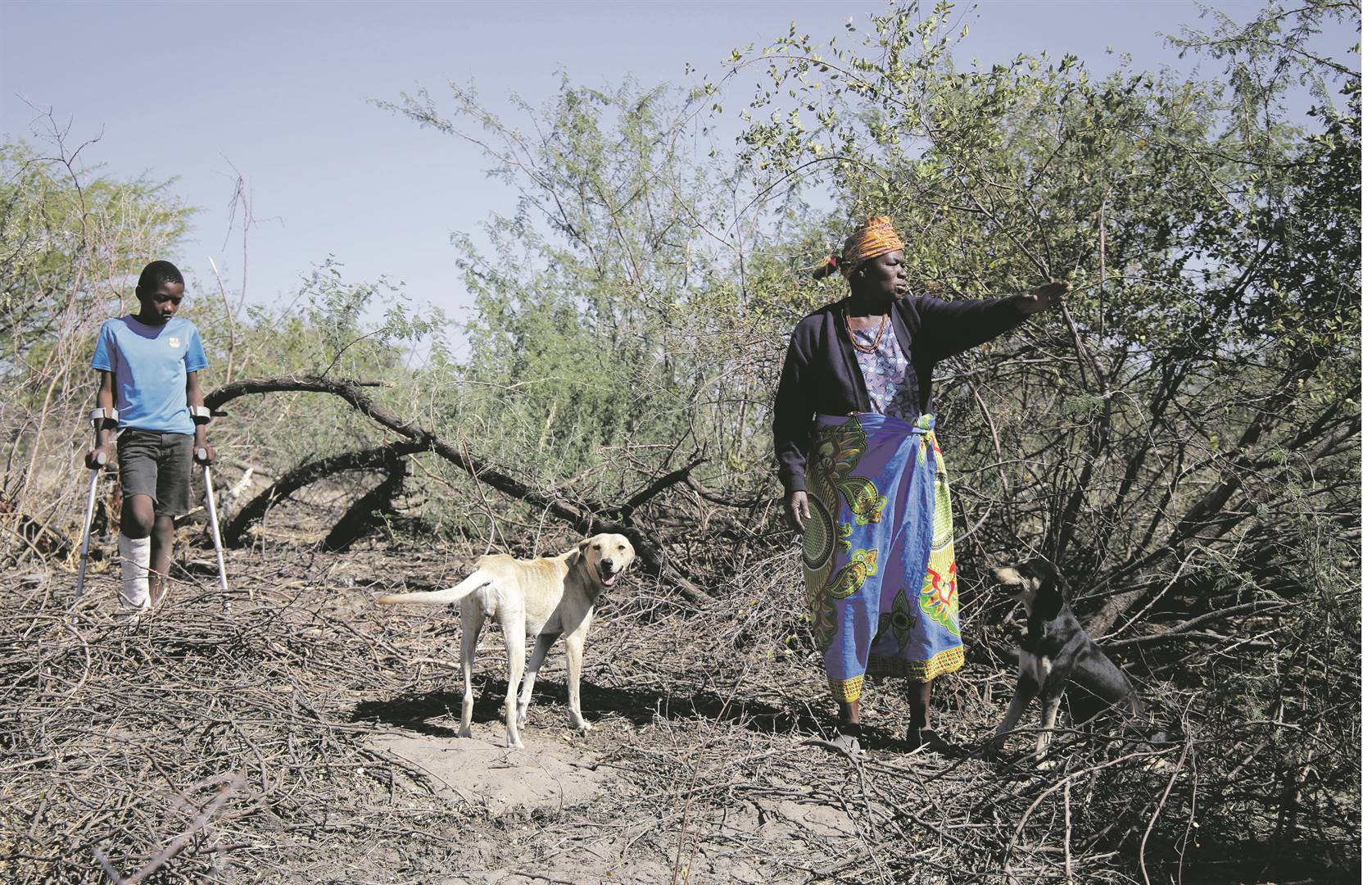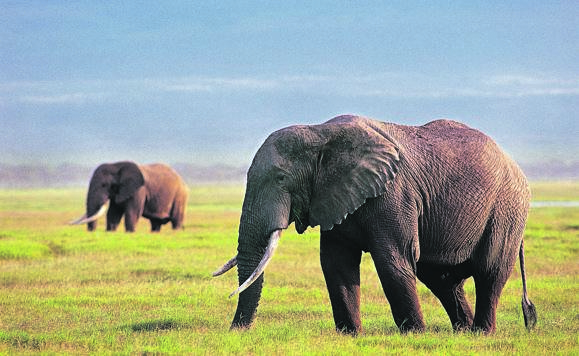
Botswana is battling to contain conflict between humans and elephants. Young Ontebaganye’s close shave is latest attack.
A late winter afternoon firewood gathering routine nearly ended in tragedy for a 10-year-old boy and his grandmother when they came face-to-face with a large elephant last month. Young Ontebaganye Ngoma can only imagine what could have happened to him had his dogs not barked continuously and distracted the elephant towering over his tiny body, with its trunk pressed against his ankle – which was left broken.
His grandmother’s bravery also saved him from being trampled to death or being severely injured.
Ontebaganye had tried to flee as the mammoth tusker went for him, but his 75-year-old grandmother, Koi Shimwe swiftly grabbed him; held him tightly against her body and bravely looked the charging animal right in the eye.
Shimwe is convinced that squaring up to the elephant – something she was taught when she was young – “worked wonders”.
This was just one of several dramatic encounters with an elephant in Botswana, a country that is experiencing an unprecedented rise in the human-wildlife conflict. It all unfolded near their homestead in Gumare, in the extreme north-western part of Botswana last month.
Unlike many, Ontebaganye and his grandmother lived to tell their story. Ontebaganye is one of 12 people who have recently been injured by the elephants.
On that fateful day, instead of returning home with a stack of firewood for cooking and keeping the biting cold at bay, Ontebaganye returned with a broken ankle and a traumatic experience that will probably haunt him for the rest of his life. He was bleeding from his nose too and his family feared the worst.
“I was so sure the elephant was going to kill me. I’ve never been so afraid in my life, it was really scary,” said the Gumare Primary School pupil, whose right ankle was still in a plaster cast.
The youngster said the barking dogs alerted him to the elephant. “I heard the dogs barking and I looked up to see what was happening and I saw an elephant.”
His grandmother explained that the elephant did not immediately approach them but instead went around some shrubs and emerged from behind.
“When it came from behind, it tried grabbing me with its tusk and I tore my dress and it missed it. It then went for my grandson who tried to run away, but I grabbed him and held him tight while looking the elephant in its eyes,” Shimwe said.
She added that the giant mammal charged at them out of the blue. “The elephant was never provoked, it just charged at us and we started running. It was able to catch up with the boy and held his ankle with its trunk. Four dogs started barking until it left him,” she said.
Botswana’s elephant herd has grown to a staggering 150 000, against a carrying capacity of 55 000.
Most of the gigantic mammals have moved from their historic ranges into human settlements.
Founder of Elephants Without Borders, Mike Chase, explains that there has been a shift in the range of elephants within Botswana, with more elephants now found further south in the country.
“This is most likely due to the reluctance of elephants to move into countries such as Namibia, Zambia and Angola where they have been met with persecution.
“Increased development and competition for resources like water and food means that elephants and people can occupy similar areas,” Chase said.
Poachers frequently target the elephants for their tusks. But while populations have been declining elsewhere on the continent, Botswana’s much vaunted conservation strategies have seen numbers increase.
Botswana recently attracted the ire of conservationists when it decided to lift a four-year moratorium on elephant hunting.
The government cited growing elephant numbers and the increasing conflict between the animals and humans, with nearly 50 people killed in the last 10 years. Six people have been killed in the Gumare area, near the famous Okavango Delta, since 2014. The most recent killing was last Wednesday, when Nthetshang Kompone was trampled to death.
Reports on all these incidents gives young Ontebaganye’s mother reason to be worried after her son escaped death.
Read: No elephant culling, says Botswana, but hunting and fences are on the cards
“Ever since the incident, I’ve been thinking of how I could have lost two people close to my heart – my mother and my son. Just that thought is devastating,” said 33-year-old Botho Kwago, the young boy’s mother.
Meanwhile, although it is a fact that wild animals such as elephants often find themselves in the same space as humans and given the growing number of attacks, Chase dismissed claims that elephants attack people unprovoked, saying this was speculation.
“I do not know the cases you are referring to, but it is highly unlikely for elephants to kill people if they are unprovoked,” he said.
BRUSH WITH DEATH
Those who have had a close brush with death in an encounter with elephants are not looking forward to another one.
After the attack, Shimwe and Ontebaganye moved from their homestead, out of fear of another attack and are now staying with a relative, 4km away.
Ontebaganye’s mother wants the government to help her son return to school without any fear of a repeat attack.
The youngster has not been to school since the attack, and his mother said he is a bright pupil who should be in class.
“My son is now afraid to go to school. I want the government to help me to take the boy back to school in a safe way,” Kwago said.
“It saddens me that he cannot go to school because he is a sharp [clever] boy. He loves school but this will destroy his bright future.”
Ontebaganye did not receive any counselling following the attack. Kwago fears her son will never like school again, following the traumatic experience.
The school is 3km away and Ontebaganye is likely to encounter the elephants on his way there.
Human-wildlife conflict has become a headache for the Botswana government. President Mokgweetsi Masisi has expressed his concern.
Masisi, whose decision to lift a four-year ban on hunting sparked a global outcry, has called on those who expressed misgivings about the move to “understand the local context”.
“Here is an old woman, 67-years-old, never been employed and is, for all intents and purposes, a subsistence farmer and gets all the goodies from a social democratic state like Botswana subsidising her feed, fertiliser and extension services and other networks.
Read: Botswana president considers culling as villagers battle wildlife to survive on their land
“She has grandkids, who are orphans, and tries to eke out a living by ploughing.
“Why do you dehumanise a 67-year-old woman when all she wants is to look after her beans by coming up with a policy that tolerates elephants threatening, eating her beans, destroying her fence, drinking her water, intimidating or even killing her when such elephants are outside the range reserved for them. Elephants have been given more than 40% of the country and this field is way beyond that which has been reserved for them,” Masisi said.
Chobe district commissioner, Sekgabo Makgosa, said the giant mammals have visited her home twice this year. She said people in her area were no longer free to move around because they were afraid of elephants.
“People have lost their lives because of elephants, but we’ve never heard anyone from outside [Botswana] put pressure on government to act.
“But now that government has reintroduced hunting, it becomes an issue because they feel elephants will be killed,” Makgosa said.
“Clearly, the lives of our people don’t matter because they are even threatening to boycott our tourism [sector] if the decision is not reversed,” she said.
Chase admits the human-wildlife conflict is a growing concern and is going to get worse, he believes people’s tolerance levels are lower than in the past and this exacerbates the negative reaction towards elephants, thus more incidents will be reported.
TALK TO US
How should we learn to live with animals and avoid human-animal conflict?
SMS us on 35697 using the keyword ELEPHANT and tell us what you think. Include your name and province. SMSes cost R1.50. By participating, you agree to receive occasional marketing material
| |||||||||||||
| |||||||||||||




 Publications
Publications
 Partners
Partners









